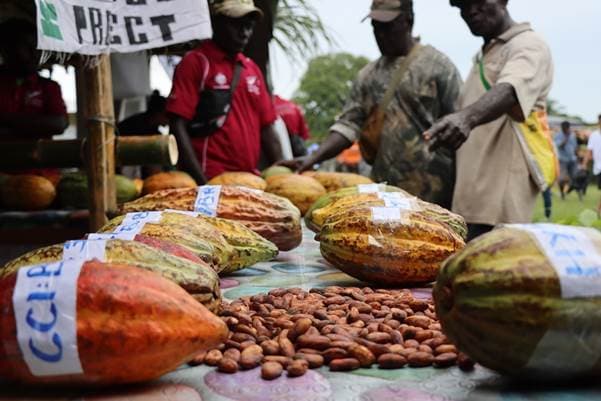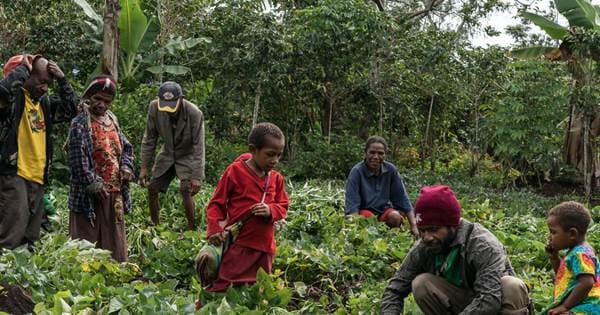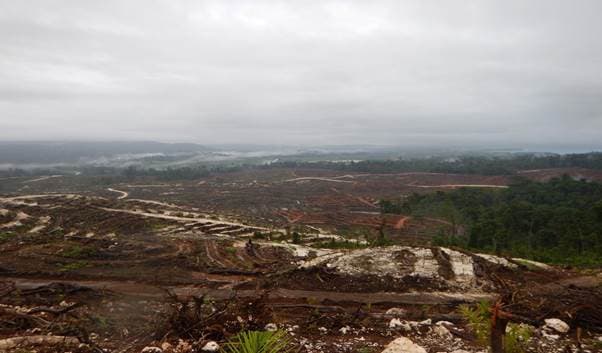Our Land, Our Wealth: Cocoa's Golden Jubilee Lesson for Papua New Guinea

(PC: AusPNGBusinessCouncil - Bougainville cocoa farmers)
By Cathy Tukne
In 2024, Papua New Guinea's cocoa exports soared past K1.2 billion. A milestone not achieved by foreign corporations, but by smallholder farmers cultivating cocoa on customary land. It is a clear message. Real inclusive prosperity is possible when land remains in the hands of its rightful custodians. Unlike extractive industries and other main agricultural exports, cocoa's benefits flow straight into the hands of local communities.
Agriculture remains a cornerstone of Papua New Guinea’s economy. Despite being overshadowed by the extractive sector, agriculture remains the backbone of PNG's rural life, contributing 26% to the national GDP, and is the second-largest contributor to PNG's export earnings at 17% according to the World Bank’s June 2025 report. The extractive industries sector dominates at 77%.
Among PNG's top agricultural exports, palm oil, coffee, and Cocoa together represent nearly 90% of PNG’s total agricultural export values. Palm oil leads at 51%, followed by coffee and cocoa at 15%.
See the table below.

Source: World Bank (2025, pages 67-68), PNG Agriculture Sector Review, CIC Reports, FAO Statistics.
While palm oil and coffee bring in more export revenue, only cocoa delivers real value to smallholder farmers.
Cocoa smallholder farmers in PNG capture up to 84% of the export price, making it one of the most equitable, fair, and empowering agricultural value chains in the country. Cocoa may trail palm oil and coffee in volume, but the economic justice is unmatched.
The rest of the agricultural export in the country benefits foreign corporations, large cooperatives, and intermediaries. Smallholder farmers, who form the backbone of production, receive only a fraction of the final export value, as seen starkly evident in the cases of oil palm and coffee.
Take oil palm; although it's PNG’s largest agricultural export, less than 10% of its value reaches smallholder farmers. The rest is captured by foreign-owned conglomerates such as Wilmar International, New Britain Palm Oil Ltd (NBPOL, a subsidiary of Sime Darby), and Ramu Agri Industries Ltd.
In a country where nearly every indigenous citizen is connected to the land, it is both ironic and tragic that rural communities are systematically excluded from the value chain. Our people are given little opportunity to harness this land for the downstream processing of agricultural commodities, when agriculture is the backbone of rural livelihood. Policies and regulations are set in favour of outsiders in our country, while our people's ability is limited to compete in global markets and capture real value. Land and labour continue to be undervalued and underutilised.
Cocoa is changing the narrative.
The booming global demand for cocoa has lifted the veil from the government’s eyes, revealing the untapped potential of our land, showing what is possible when landowners are empowered and not sidelined. Today, over 2 million households are generating real value by cultivating cocoa on customary land. This success story is a pathway forward.
What makes Papua New Guinea truly unique is that the majority of the land is held under customary ownership. Land is woven into our identity, culture, food security, and rural economy. For Papua New Guineans, land is not merely an economic asset. It is more than a livelihood. Land is life.

Fifty years into nationhood, our land is being surrendered not to the people who depend on it, but to extractive industries, sprawling plantations, special economic zones, carbon trading schemes, and other land-grabbing ventures that have consistently failed to empower our communities the way agriculture has. This persistent plague of land dispossession continues to enrich foreign investors and the government of the day, while failing to uphold the protections envisioned in our National Constitution and Development Goals.
The land that sustains our communities is being commodified, not for collective progress, but for profit-driven agendas that erode our sovereignty, undermine our livelihoods, and silence our rights.
Our economic structure is unsustainable. Today, PNG’s economy is heavily reliant on extractive industries and not agriculture. And within the agriculture sector alone, as seen in the data, there is a huge imbalance in who benefits more. PNG's agricultural export remains skewed. This glaring imbalance calls for urgent reform.

(PC: GW logging from SABL Bairama, PNG)
At the National Government Collaboration Roundtable on July 14 this year, Koney Samuel, Secretary of the Department of National Planning and Monitoring, said it plainly:
“Agriculture must be revolutionized if PNG is to prosper.”
His words echo a truth our National Goals and Directive Principles have upheld for five decades. The time has come to return to the land, uplift its custodians, and rebuild our economy on the foundation of self-reliance and equity.
As PNG celebrates its 50th Independence Anniversary, we must return to the vision that guided our founding leaders.
Goal 1: Integral Human Development
Goal 2: Equality and Participation
Goal 3: National Sovereignty
Goal 4: Natural Resources & Environment
Goal 5: Papua New Guinean Ways
These principles are the roadmap to build a nation where land, wealth, and power are in the hands of the people.
Cocoa smallholder farmers have already shown us the way. Their success proves that when communities are empowered to manage their land, prosperity follows. Let this be our golden jubilee lesson to protect customary land, uplift its custodians, and place our people at the centre of national progress. Our land is our wealth.
